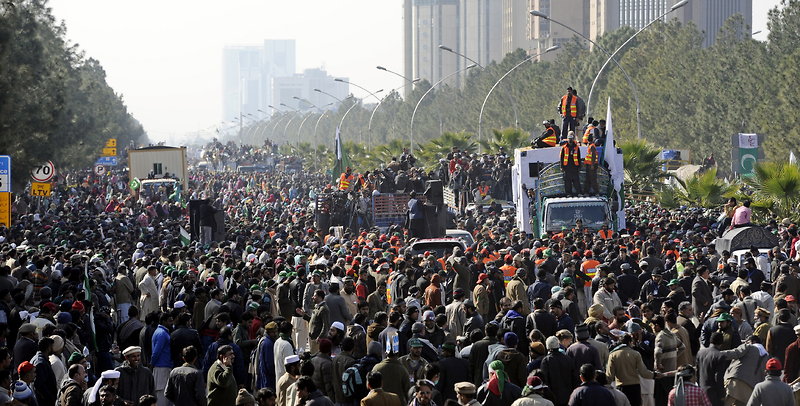US Report Critical of Pak Protests as anti 'Sustainable Democracy'

NEW DELHI: A report prepared by the independent Congressional Research Service (CRS) for the US Congress, titled “Pakistan Political Unrest” has concluded that the ongoing anti-government protests in Pakistan have “reversed efforts for sustainable democracy.”
Outlining the United States’ response to the outcome of the protests, the report states that “any overt military ouster” of Pakistani Prime Minister Nawaz Sharif “could trigger another round of democracy-related US sanctions on foreign assistance to Pakistan.” This, in turn, could lead to “an indefinite halt to what has been one of the highest-priority American aid programmes since 9/11,” the report adds.
The report also focuses on the impact of the protests on Pakistan’s relations with India, saying, “the Pakistan Army's more openly direct control of the country's foreign and security policies may, over time, shift Pakistan's approach toward Afghanistan further into a policy framework that seeks to counter Indian influence there.”
"It [the protests] could also present new challenges to the goal of improving India-Pakistan relations, and put a damper on hopes for effective regional cooperation and commerce in South Asia.”
The report noted that the protests have strengthened the Pakistani army, as "whether Prime Minister Sharif sought out or merely acceded to the Army's late August intervention as a facilitator between the government and the protesters, most analysts contend that, because he has not demonstrated civilian control over domestic security, he will be left in a weakened state… While few assess that Sharif's government now faces an imminent threat of ouster from office, many observers see the current unrest weakening Sharif and representing a setback to democratisation in a country that has suffered three outright military coups in its 67 years of independence.”
Outlining the impact of the protests on Pakistan-US relations, the report continues that there could be “negative implications for US efforts to strengthen Pakistan’s democratic governance institutions. Any overt military ouster of Sharif could trigger another round of democracy-related US sanctions on foreign assistance to Pakistan, potentially putting an indefinite halt to what has been one of the highest-priority American aid programs since 9/11.”
The report also noted that there was some circumstantial evidence pointing to some link between the two political parties that have been leading the protests -- Pakistan Tehreek-i-Insaf (PTI) and Pakistan Awami Tehreek (PAT) -- and the military establishment.
However, “observers doubt that the army would seek to take direct control of the government, not least as it is embroiled in offensive operations against Islamist militants in western tribal areas.” There could be an attempt by the army, instead, to foster “a soft coup in which popular support for the civilian government is reduced such that the army can take full control of foreign and security policies.”
The report criticises the Pakistan Muslim League - Nawaz (PML-N) government, saying, “beyond an annual budget, parliament has failed to pass a single new law under Sharif. Important posts — including that of foreign minister — remain unfilled, and regulatory agencies have no chiefs.” It further notes that the PML-N is “too centred around one family” whilst Sharif “maintains an autocratic and detached ruling style” and has “neglected to reform Pakistan’s sclerotic governance system.”
Outlining the reasons for the protests, the report directly implicates Sharif. “Mr Sharif’s perceived air of detachment from the country’s woes and his increasingly poor relations with the generals appear to have combined to embolden some of his political detractors to take to the streets, by many accounts with covert or implicit prodding from the army.”



